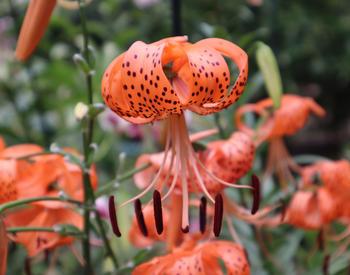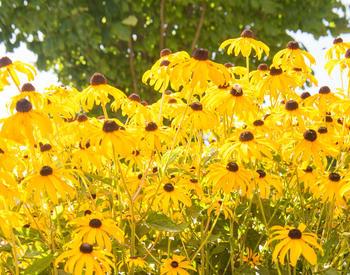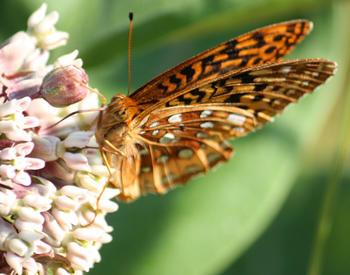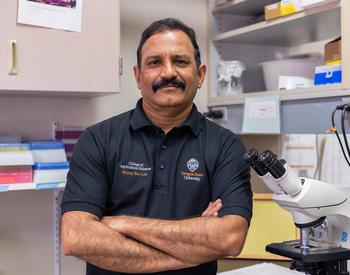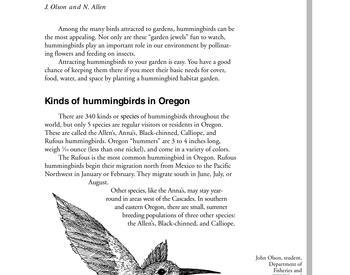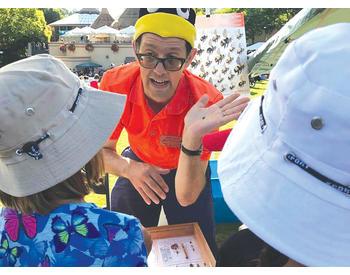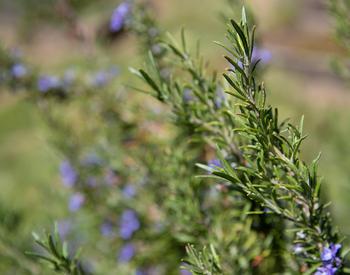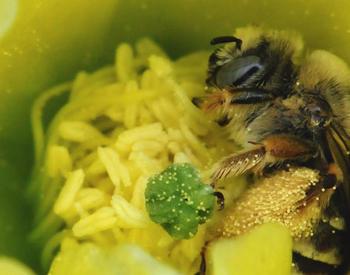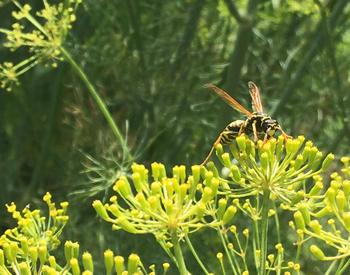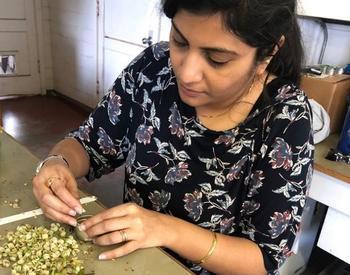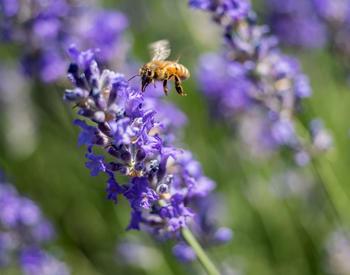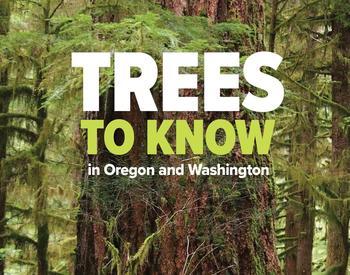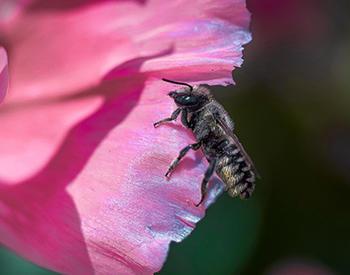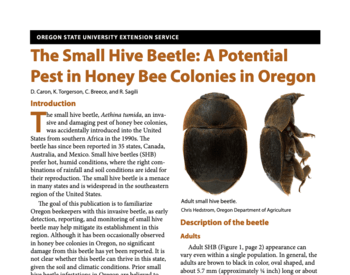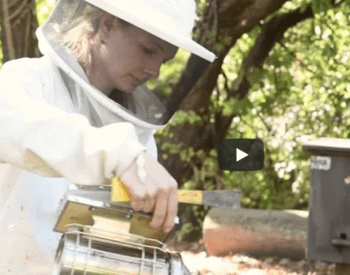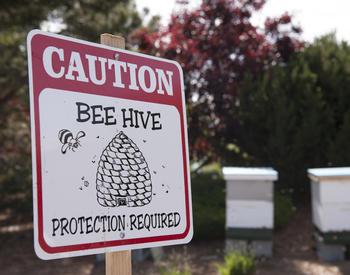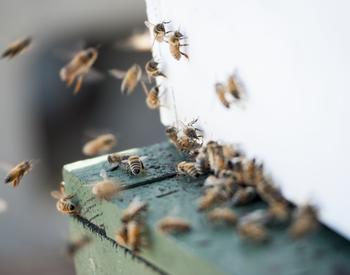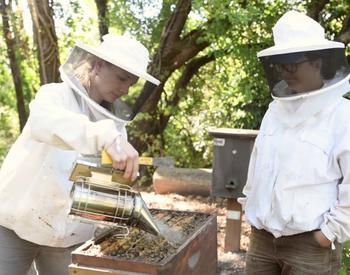Transcript
[00:00:00] Miranda Jones: First as a brief preface to this episode, my name is Miranda. I am a student at Oregon state university, and I spend around 20 hours of my league working on projects for the pollinator health lab, where our guest today is principal inspector. When I told Andoni, I was hoping to interview him. Beekeeping as a part of my honey bee biology class, I wasn't really expecting for him to ask me to become a broadcaster to add to the fund and donate has told me to quote, break the mold of the podcast, do as little research as possible and ask whatever I want.
[00:00:35] I am as a result, thinking on my feet a fair bit, and yet unsure we'll craft an entertaining conversation. Thanks to the fact that everything I've learned so far about this bee searcher has been incredibly engaged. I suppose I would like to start at the beginning. So when did you start beekeeping and what drew you to the practice?
[00:00:53] Andony Melathopoulos: I started beekeeping I, when I was in an underground. So I was at Simon Fraser university. And at the time it had one of the most I don't know, mark Winston was Dr. Mark Winston ran the honeybee program at Simon Fraser university since retired. And he was the authority on honey bees. He, the book right behind there.
[00:01:14] Biology of the honeybees. He was the author of, and so I remember being in Vancouver, Canada at the time I came from an urban family. I never had any I'd never worked in agriculture before I was in a medical genetics lab of scoring. Kane arrived. BEETUS elegance, crosses of these roundworms on an eager plates.
[00:01:37] And I, at the time in Vancouver, the nineties, there was a kind of like a resurgence of a back to the land movement. And I thought one roundworms. Interesting and complex, but they were very seem disconnected from society as a whole and to and I wanted to do something more practical.
[00:01:55] There was this beekeeping class. It was the last class that Winston taught. So it was called biology for 27 and upper level course of biology of the honeybees. And I took the class and I remember the very first day of the class. He asked if anybody had seen a honeybee colony. And I raised my hand immediately cause I was very, I never had any inhibitions.
[00:02:17] And he asked where I'd seen it. I sat on the bike ride up to school. He said no, that's a weather station. That's not a honeybee colony. So that was my start.
[00:02:29] Miranda Jones: Oh, so you're a part of his last class,
[00:02:32] Andony Melathopoulos: the last class that mark taught in biology, honeybees I took. And actually the TA in that class was Dr. PhD supervisor, Tanya Pankey, who was at Texas a and M. And I had no idea what I was getting into, but that was back in the nineties and that I've never looked back.
[00:02:51] Miranda Jones: Amazing. Yeah. He's running the honeybee lab on this floor, a decent to what you're doing. Yeah.
[00:02:57] Andony Melathopoulos: It's really, it's a really great coincidence that we have this common background which all kind of traces back to Dr. Winston. Wow.
[00:03:04] Miranda Jones: So at the end of that course where you independently beekeeping?
[00:03:10] Andony Melathopoulos: No, I had notes still had no sense of it. So what I happened. They had you could work in labs like you're working in, in, in my lab. I did the same thing as an undergraduate and I remember the beekeeper at the time. So they had a beekeeper. So mark, was the scientist and there was a technician.
[00:03:27] Steve Mitchell was his name. And Steve, I remember going to my first Biard in the Fraser valley, I think it was in it was adjacent to a. Orchard. And I remember we were going through colonies for the first time doing something in the spring. And I remember getting stung five times in the ankle.
[00:03:44] And I remember I couldn't walk the next day, like it just swelled up, but I was still up for it, but we did a bunch of research projects. I remember one that we did was around suppression of swarming. Seeing the, at that time there were working with pheromones, trying to develop a commercial product that would suppress warming.
[00:04:00] Cause it was a big problem. And I remember we would go there first thing in the morning and we would go through the columns and score them and look for queen cells. A lot of very going through colonies, lots of Callie's needing the replication. And I do remember the one thing early on that I've almost forgotten about early on in beekeeping, you have this weird sense of like, When a bee lands on the side of the veil, it looks like something is moving like a bear because you're not used to being around all these insects.
[00:04:30] And I remembered that distinct feeling of just turning my head. It's what's that? What's that it's just, yeah. Those early days and sort of the mystery of getting into colony, being sorted. In a bee yard with thousands of bees disrupting colonies. I take that for granted now, but I remember at the time how novel and strange and weird and wonderful it was.
[00:04:51] Miranda Jones: So you have published a lot about the management, how to combat diseases and pests and things like that. Was it. At this point, beekeeping that DRI that to that type of recent,
[00:05:04] Andony Melathopoulos: no, you know what it was. So the great thing about being in the Winston lab, mark was a great supervisor, really great.
[00:05:12] And he would make sure the undergrads and then I became a graduate student there, went out and did the industry talks. So he didn't do those, he would send us out. So I'd have to go to the Surrey beekeeping club or the. President of one of the B clubs as a graduate student down in the one in downtown Vancouver.
[00:05:32] And you'd have to encounter people, real people. The thing that I missed being in a medical genetics lab, I had to really talk with beekeepers and learn their issues and problems. And a real pivotal moment for me was I was, I got to go to as a master student to, to provincial beekeeping meetings, the BC, no three in a row.
[00:05:53] I went to the BC HPA, the BC honey producers, the Alberta meeting. Gotcha. When meeting and the Manitoba meeting and the person who accompanied me was a person who's now retired and recently passed a USDA research lead bill Wilson and bill was this guy who would go into the room and he would know everybody's name is this candidate he's.
[00:06:16] The research leader, but he would hit this little notebook and he would memorize everybody's name, he'd know everything about their family. And so the beekeepers I learned there that if you really want to have a connection in agriculture, you have to actually be invested with people and he was invested.
[00:06:32] And I also remember, I would go to these scientific meetings and people would have these error bars and prediction and these models and bill just put a number up there. 300% increase in honey yield or something, or. And then I realized in science communication, sometimes you have to really put yourself in the shoes of the people that you work with to be able to, have any kind of traction.
[00:06:56] And so when I started to do research, I really always kept that in mind, is that research trying to think what were the key problems that people face that they had articulated to me, but also thinking that sometimes those solutions. I have to come in the form of what, how beekeeping operation is structured.
[00:07:13] You can't come up with a swarm suppressing tool that involves I don't know, some kind of gizmo, it has to work in the actual operation of a. Commercial beekeeping operation that often involves 10 or 12 staff, and they're going through colonies, they've got a division of labor it's very intricate and it has to work in that system or just nobody will take you seriously.
[00:07:32] So that was always a, something that left a deep mark with me.
[00:07:38] Miranda Jones: Yeah. I think those are incredible skills to learn early on in your career. And it seems like you're still teaching those to me and your other undergraduate students. Yeah, I can't count how many times you told me to turn data into a picture or make a font bigger.
[00:07:52] Oh, good. So you've been
[00:07:54] Andony Melathopoulos: doing a good job. That's you know, that's mark. That was mark Winston. He also really emphasized that mark always, he became a science communicator. Career and had no patience for anything that was convoluted. You use complicated language. I remember getting my first, I wrote as an undergraduate, just like you.
[00:08:12] I did a, my first paper was on using queen mandibular Fairmont and trying to understand if it would suppress, F after queen cell was initiated, whether you could suppress it again. And I remember the first form manuscript he gave back to me was just full of red and the thing. It's keyed into is any kind of like language that was convoluted.
[00:08:32] He just made, he pounded into me just, it has to be written assertively, straightforwardly, and yeah, that was great. Thanks. It's a big honor to be told that.
[00:08:42] Miranda Jones: Yeah, definitely carrying on the legacy. All right. So in preparation for this interview, I looked through some of your publications and I didn't peruse them super carefully, but I was just wondering if you've noticed anything you've researched implemented into beekeeping or have you implemented any of it yourself?
[00:09:03] Andony Melathopoulos: Oh man. I don't think anything I've ever done has really been picked up by anybody. No, it's a good, it's a good lesson because I think most people think that science is eh, is that some kind of. Superiority to practice on the ground. And I would say most of the things that I thought would stick have not like by and large.
[00:09:25] And I remember working on, I knew Varroa mites were always the key problem for beekeeping and I did some work with some of that might've stuck. You don't know, as a researcher, you don't really know how things stick. Like I did a lot of work with a natural product thymol to try and see.
[00:09:42] How to get it implemented in the early days when it was just coming onto the market, trying to figure out, the different products in the release rates, how that affected efficacy, because with a lot of natural products for Varroa control, there's a huge amount of variability and control, which is, very difficult to manage.
[00:09:58] And so some of that work, I would say, had some. We did a whole lot of work on American foul brood. When I was working with Dr. Steve Cornell, the Beaverlodge research farm. And I think, we, along with our colleagues at USDA were able to establish some of the new antibiotics had lot quite long persistence in honey.
[00:10:19] And I think that information actually helped Canadian beekeepers who have. Port most of their honey for export, understand how to use this product and really be careful with using these treatments outside the fall, because it would end up in honey in honey. So yeah, there, there are pieces there that have had.
[00:10:38] But I often, sometimes, maybe as a researcher, it's hard to know how things have an impact. But yeah, I don't know if there's any slam dunk we're in the S just a couple doors down from us as Sean Mellenbach or a world famous hazelnut breeder who saved the hazelnut industry by, coming up with the breed of, figuring out the genetics of a blight.
[00:10:58] And it, I haven't had any of the. But sometimes those are hard to come by. You try as hard as you might, but it is difficult. I think I've had difficulty. Sometimes
[00:11:09] Miranda Jones: I think that even if even if a paper just serves to be a citation for someone else, everything is a contribution.
[00:11:16] Andony Melathopoulos: Oh, I think so. For sure. Everything you never know. That's the thing I do think is you never know who read something and then they did something with it and you don't. Connections that th that's all invisible to you as a researcher. And I think as a researcher, you tend to be a good researcher. I think it's tends to be hard on themselves because they really do feel the pressure of being of offering service.
[00:11:38] And if you didn't, if you're so cocky that you're just like so full of you're in your head, I think that would be a really bad a really bad habit.
[00:11:47] Miranda Jones: So you mentioned that some of your early beekeeping experience was as a part of a lab taking care of bees as a part of experiments. I have a very similar experience through your bees. Do you, are these your bees did you buy them, are you taking care of them personally and submitting them for research projects or do they belong to the university?
[00:12:09] Andony Melathopoulos: Oh, they belong to the university. They belong to the university, so they were Simon Fraser's. But the thing is I imagine I've seen it. I've seen it with you guys as well. Students in the lab, the pollinator health lab at sometimes it's it overflows into your personal life. And I do remember.
[00:12:24] Once getting a bee colony. And I remember I bought it, but I didn't have a car. So I took it on public transportation and some bees did actually, it was a cardboard nuke box with some BS, did escape on the bus and I had to discreetly go over and squish them. I dunno what I was thinking, but it was actually for a friend Ryan domino actually.
[00:12:42] And what Ryan did. He wanted. He wanted a headboard in his apartment, rented apartment. That was a transparent beehive. And so we punched a wall in Israel, in Vancouver and got the headboard and it was Ryan really loved it hot. Like he had all these plants he'd love to plant and his room was really hot.
[00:13:02] So it was like a perfect. For, but he couldn't sleep. So we had to take the colony out. So yeah, no, I have my own personal callings. And the other example of this was when I worked at the my fondly, I worked at the beaver lodge research farm. It was the most farthest. Agricultural area north America, it's home to Canada's honeybee lab.
[00:13:23] And I worked there for about a decade and there, I got to see some of the most innovative beekeepers on the planet. Things that people knew how to do. There were remarkable. I just still. I am drawing on that experience. When I talk to beekeepers here and I started keeping my own semi-commercial operation there, what I, where I would produce new nukes, which I, small colonies.
[00:13:46] And so I would do that after work. Cause you know, you get all these ideas you're at. And, when you're in a project, you're in a project you're constrained. You got to serve, you're given some grant money and you have to do something in a specific way and to get, but you really want to apply what you learn.
[00:14:01] So I have periodically had my own bee colonies where I've mucked about and tried to tried my hand at it.
[00:14:08] Miranda Jones: That's awesome. I didn't know that,
[00:14:09] Andony Melathopoulos: There are many secrets.
[00:14:13] Miranda Jones: Yeah. I feel like every question you answered could go in a million different directions when they're I do have a question about that though.
[00:14:19] Could you describe a little bit more how to create a nuke from a larger colony and how you went about selling those.
[00:14:26] Andony Melathopoulos: That's a great question. So I, I had learned from these Northern Alberta beekeepers it's very far north, but they were rearing there. It was people think about in Canada that, the old style beekeeping, actually before the 1980s, they would kill their colonies every year they would kill their colonies and they would get new packages from the U S and they would restock that border was.
[00:14:50] It's in the in the 1980s because of Varroa, tracheal might first and the Varroa mites. And so these beekeepers learned how to, and in large part, because there was a little really efficient college program at Fairview college. Taught all these beekeepers, how to, or Queens. And they started to rear lots and lots of Queens.
[00:15:11] And the way that they made nukes was connected to this. So because they couldn't get packages, if you'd go through the winter and you'd have 20% loss, very expensive to get packages at the time, you could only get them from New Zealand. They'd have to be flown from New Zealand on an airplane. It was, this is really exciting.
[00:15:30] What they did was in June, when the colonies started to get strong, they would put on their first honey super so that they've got the brood nest. When you come out of winter, you've seen this already one or two brood boxes and what they would do when the Coleen got a really strong. At that point in June.
[00:15:50] And they're about to put the honey super on, they would take what, two to three frames of seal brood and they cheek all the bees off it. So you're just left with the frame of brood. They then replace, you've got three gaps, two to three gaps in the brood nest. They put some frames in there from the honey super.
[00:16:08] They put a queen excluder on. And then they put those frames of brood above the brood nest. Now, what that does is that one of the most time consuming things you can do in beekeeping is try to find the queen. And so you don't have to find the queen because you've shaken all the bees off they're all below in the brood nest now.
[00:16:26] And then what happens magically is that the bees then come back up to incubate that brood they're attracted to the brood. And so then you drive around. And you just pick up those frames of brood and take them all to a holding yard, put a queen cell in them. And there that you could do one frame of brood and bees and a queen cell in June.
[00:16:45] And that would grow up to be a calling that they could winter. So they'd be making up their losses following year. And you've seen this here because we. The styrofoam new boxes, which listeners was developed in Northern Alberta. Who was the guy up in Fairview? The Cowens no, not accountants.
[00:17:02] That's the extracting company. What the heck is the name? It's gone back a few years. They came up with a styrofoam new box. And so we do this here. You've been part of this. You were feeding them all through the fall. We make them up in July. We put a quick frame of Bruton bees, a queen cell, and some empty frames, and then they grow and we feed them syrup.
[00:17:21] And right now outside, we've got a whole bunch of these boxes that you fit a styrofoam new boxes, and they winter really well and styrofoam here in Oregon and allows me not to have to buy packages every year, reduces my cost. What I would do in Northern Alberta is I would, I didn't want, I was had a full-time job.
[00:17:38] I didn't want to extract honey. So I'd make a bunch of these nukes. Every year I take, I sell off a whole bunch of callings except for two or three. And then. It's I call, smash them down. I would just turn them into 40 colonies. And then I'd get them to the winter and then I'd sell them off again.
[00:17:56] So I had this, it was equivalent to what many people on would call a cow calf operation. I was not making any meat. What I was doing was I was raising calves and then selling them. And it was really easy. It didn't involve any facilities. I did it all out of the back of a Ford escort. I've always had vehicle problems.
[00:18:15] If you keeping career never had a real flatbed truck as I should have. So be it. I worked,
[00:18:23] Miranda Jones: what does nuc stand for?
[00:18:25] Andony Melathopoulos: Oh, this is a great question. Yeah. It's a nucleus colony, so it's meant to be a colony. That's not in full production and maybe in some ways, this is a hold over from the days when people made, a colony that would make.
[00:18:38] As opposed to a colony that sort of a colony and waiting that's in some ways it's blurred a bit because now what's different from the beekeeping that I was used to in Canada is most people here, 75% of their income comes from renting colonies for pollination. And so there, the colony sizes, dictated by the contracts, but up there, you needed a certain amount of bees in a colony by July 1st, if you were going to make a honey crop, and if you didn't.
[00:19:04] It was not viable and be considered a nuke.
[00:19:06] Miranda Jones: The far north, you mentioned it was very far north. Is that why this practice began because would they usually destroy their colonies? Because the winter was so long.
[00:19:17] Andony Melathopoulos: Okay. Exactly. Yeah. All right. It was an easy time. You would, in some ways there was a lot of very small-scale beekeepers at the time.
[00:19:25] Cause it was very efficient, they would use calcium Sinai. That was the chemical that they would use because it would leave no residue in the comb. It doesn't accumulate in the. So they'd kill the colonies every year. And then it gave them a time, a chance to go through their comb, look for problems.
[00:19:40] The colonies would be killed at the end of August. And so there'd be lots of Paula left in them. So when they got their packages of bees from California, they had beautiful frames to put the bees on. It was a very. It cut down their costs. And after that, there was a, quite a wave of consolidation in the industry because it got more expensive to keep bees after that.
[00:19:59] Miranda Jones: So I've learned a lot about beekeeping through my job here, taking
[00:20:03] Andony Melathopoulos: care of
[00:20:05] Miranda Jones: Oregon. But in Oregon we've got a, another complicated situation. Our winters aren't super long, I don't think, but we do have a drought. So can you talk a little bit about how the drought has been affecting bees and beekeepers and how that's affected jobs like yours and people who are even more dependent on their bees for income?
[00:20:24] That's
[00:20:24] Andony Melathopoulos: a great question. And I think it, as you well know and, be one of the first people to remind. W, we are running into situations where we'd have, permanent drought this year. We still haven't made up our water deficit and there's some counties in Oregon they're just in perpetual water crisis.
[00:20:41] And so you can't irrigate your way out of this problem. You have, Bloom that happens early and you're going to have period stretches of time where honeybee callings don't have anything to eat. And so that ends up the beekeeper having to subsidize with feeding syrup to get them through keep them healthy.
[00:21:00] And so I do think there is a big need and I don't know how to solve this problem. It's one of the things that keeps me up. No, how to solve it. And I don't, I still am looking for opportunities to solve it is how to put in drought tolerant, inexpensive pollinator habitats for not just honeybees buffer the wide variety of bee tax that we have.
[00:21:23] In the F in the, after the Blackberry stop blooming here, that was not a problem I had in Alberta where the honey flow started and it wouldn't stop until frost here. We got a, 80,000 honeybee colonies that really are critically important for agriculture in the state, but also for pollination.
[00:21:41] When the almonds that are going to be running into a crunch.
[00:21:44] Miranda Jones: I did skip a bit of a step though. We're in Oregon right now, not Canada. And I want to talk a little bit about how you came to the state and what you're a part of here, what you're doing for the Oregon bee project.
[00:21:57] Andony Melathopoulos: Yeah. It was a little bit different, cause I was a hardcore AICPA culture researcher, although I had done I did.
[00:22:05] And get my PhD later in my life. So at age 40, I went back to get my PhD and I did work on a crop pollination and a native bee system, a really wonderful native bee system in low Bush, blueberry in Atlantic Canada. I also had a wonderful postdoc with Dr. Shelley Hoover working again on a pollination related problem.
[00:22:25] But when I got here, the, this position was not about AP culture. We already had. One of the finest agriculture programs in the world here. So it wasn't, they didn't need an agriculture researcher, but they were having increasing conflicts over pesticide use wild bees issues that I wasn't equipped for, or it didn't have experience with.
[00:22:47] And so I guess I what's held me in good stead here as I've come come to Oregon, is that the recognition that none of these problems are solvable without, broad, civil, social engagement. You can't solve these problems with a science problem with this. There's no science question that can get resolved.
[00:23:07] That's going to deal with these. And oftentimes you're going to need to get people working together in some. And that may not necessarily share the same values. And so I think the Oregon bee project came out of the legislature, which also came to the same conclusion after a string of bumblebee poisonings that occurred on Linden trees with insecticide, use the T pollinator health task force struck by the legislature, wanted to see an educational approach.
[00:23:35] And the Oregon bee project has really tried to think about very deliberately about all the stakeholders that are involved and what their education.
[00:23:42] Miranda Jones: What are the, what are some of the specific things the project does for beekeepers in Oregon
[00:23:47] Andony Melathopoulos: for beekeepers? A couple things I would say we'd work very closely with pesticide applicators. And and the way that we work with pesticide applicators has been strongly flavored by my interaction.
[00:24:00] With Oregon department of agriculture. So rose catcher, Dorian at ODA has been a mentor of mine, walking me through pesticide regulation and education, but also Harry Vanderpool who's the who's a beekeeper vice presence. And I'm vice president, former president of the Oregon state beekeepers association.
[00:24:18] He gives a lot of very impactful talks to a pesticide applicators. Really focusing in on what, the one thing I will always love about how Harry talks to pesticide applicators. He thanks them. He says, you do a great job. If you didn't do this, we'd have vector control. We would lose, see crops, he thanks them.
[00:24:34] He makes sure that they're respected. And then he tells them here's some things that can really impact honeybee, callings. He brings, he walks them through some of the key pinch points in biology where pesticides can have an impact, but he also. He also gives them a, gives them a couple of very concrete things, do this, and you'll have, my life will be so much easier.
[00:24:56] And so I've really taken that on. And all the pesticide education I do, which is considerable on most of my job is some form of pesticide education has really focused in on trying to think about. Yeah, I got you for 40 minutes, 50 minutes. I got to talk to you. What are the three things that you need to communicate to you in a way that's practical, helpful and allows you to, get your job done at the same time.
[00:25:19] Miranda Jones: I think that's a great approach. Yeah, I think this is a very like intersectional project. I feel like we work with a lot of different people from a lot of different sectors, but it all comes around that. Same sort of problems. And you call it a risk cup. Is that what you called?
[00:25:33] Andony Melathopoulos: Oh, risk the risk up.
[00:25:35] Yeah.
[00:25:36] Miranda Jones: So I think it's fascinating to learn how you practically go about a really complicated issue. I do want to talk a little bit about your work. Around pesticides, because I want to learn a bit more about this thing called a pollen trap and how you're using it in research this summer, I was sweating and Clover fields, trying to pick all of these pesticide Laden, Clover leaves and Clover flowers as a part of a study.
[00:26:01] And you were better the side of the field with some colonies collecting pollen. Can you tell me a little bit about what pollen tells us about pesticide exposure and how these traps work?
[00:26:11] Andony Melathopoulos: Yeah, the traps were developed originally as a a form of income diversification for. Two things.
[00:26:17] One was to trap Paul and then feed it back to colonies. Especially this time of year in the spring, when colonies are in, you want the callings to grow quickly, but there is a natural pollen. So if you feed it back in conjunction with other, sources of protein, like soybean powder you can, build the colonies up.
[00:26:35] But the other thing was income diversification that beekeepers could make a honey crop and then they'd have some pollen and people actually. Paula and they put it they eat it as a kind of nutraceutical. And that was the original source. So that there's a whole long tradition of very complicated traps, but basically the way they work unlike, the bees that you work on squash bees, which have.
[00:26:54] Scope of where the pollen is, tightly bound on their back legs. And it's like loose honeybees and bumblebees or curriculum pawn carrier. So they add a little bit of moisture and they make a pellet. And so that pellet is often quite a bit wider than the beef. You were to look at them in profile.
[00:27:11] And so they, the bees, when they come back through the entrance, there's some kind of gap that a bee can squeeze through, but knocks the pollen off. The legs into a hopper. Now that is and over a few days you can accumulate lots of this, but what it really, one thing that's really useful for and many researchers have used it for this purpose is that those bees are flying all over the landscape.
[00:27:35] You don't even know where they're going and you can tell. The plants that they've been forging on. And Emily Carlson, our PhD student here does this a lot for her work. You take the pollen, you digest the coat around the pollen in this process known as the dialysis. And you can see that. Paul and structure, and you can tell what plant it came from, but also if that plant has a pesticide residue, then it will also be trapped in the pollen and you can extract it and you get this great little snapshot for the time that you were trapping the pollen, the whole kind of composite amount of pesticides that are POL and soluble that are entering the colony.
[00:28:15] So it gives you this great monitoring capacity for a single colony. The sweet times, period. So
[00:28:22] Miranda Jones: I guess if you want to learn more about that, keep an eye out for Emily's
[00:28:25] Andony Melathopoulos: episode. Oh yeah. We got an episode with Emily on coming up and and there's some other, we've had some previous episodes on this as well, but it is a great technique and one that you can't really use with native bees, because I think, with solitary bees, you just can't get enough Paul.
[00:28:41] And to do it. Yeah, honeybees become a really great indicator species for all the rest of the bees in terms of like pesticide in the landscape.
[00:28:48] Miranda Jones: I've heard some people talk about competition between honeybees and native bees for resources. Do you have any thoughts on that as a beekeeper who also works on conserving native bee populations?
[00:28:59] Andony Melathopoulos: Absolutely. It's an area that we're really interested in developing cause beekeepers are concerned about it. Obviously beekeepers are some of the first people who. Care about bees often, we've got, as the you were, the former labels are for the Oregon bee Atlas. And many of our volunteers are beekeepers.
[00:29:16] So beekeepers are, are interested in Biba diversity. And I think the it's a complex issue and one that. They'll try and grab grapple my head around on the one hand there is undoubtably, a honeybee colony is unlike any other bee taxa that we have in north America. And the colonies are very large.
[00:29:39] And so they can, a large number of them in one spot can quickly deplete nectar. But, it depends on what you're talking about. There was a great study that was done by Jim Kane, who we both met a really sharp researcher where he looked at creosote Bush and he looked at the proximity of honeybee colleagues to this big mass bloom, the creosote bushes, like rabbit brush on the Eastern part of the Oregon, where you have this a lot of bloom and he would go and he would look at the answers and how much pollen was left on them.
[00:30:12] And he concluded that. That bloom is so intense and so strong. There's a lot of pollen that just never gets harvested. So that's one scenario. The other scenario is you have some rare plants with honeybees in the area, and perhaps there's a group of bees that specialize on that plant. What I've noticed though is where those rare plants exist in Oregon are typically places where there aren't a lot of honeybee colonies.
[00:30:34] The Cisco use the Steans. The Willow was, those are really. Beekeeping area. So our Bebo diversity and honeybee colleagues may not overlap to a great extent were they are. So that might just be a natural way, which we don't have that competition doesn't manifest itself, but there may be areas.
[00:30:51] And I think specifically with bumblebees and honeybees, where there may be overlap, I do think though one. The hypothesis that I've been interested in. I just have not been able to pursue, oftentimes when people try to create habitat for a native bees, they focus on native beef plants that service those native bees.
[00:31:12] And we know in the Atlas, there's a whole host of plants that bees visit, but I've often wondered if one another stress. Would you be considerably less cost is planting for honeybee specifically because honeybees may not venture onto plants that they don't really want to go to if they have an abundant amount of something like a Clover.
[00:31:33] And so I've often thought if. Maybe that's another, if the, a dual strategy would be best where we identify the hotspots in the state, where there are in debt, they're intact plant communities, and really spend time and money and energy protecting them at the same time in more agricultural areas, creating places for honeybees so that they don't start to wander into those natural areas.
[00:31:56] They're really sticking into agricultural areas. I don't know, but that's open question. It's not. For early career scientists like yourself. I think there's some great opportunities there to explore that and come up with some recommendations.
[00:32:08] Miranda Jones: Yes, that's fascinating.
[00:32:10] If anyone wants to go answer that question, go for it.
[00:32:18] Okay. So we talked a little bit about native bees and honeybee interplay. I want to just touch on the way that the honeybee has become in a lot of ways, the flagship species for the pollinator crisis, if you will. Which I know we've debated a little bit too. But do you think the honeybees inappropriate represents.
[00:32:37] Or pollinator health as a whole.
[00:32:38] Andony Melathopoulos: That's a great question. Yeah, maybe, and that's maybe sort of some of the problem. And I've seen this conversation shift over time. Like I think it's no longer the case that, honey bees are still broadly construed as, the only. I get many emails from people around the state about concern.
[00:32:56] And I had one this morning. For example, somebody wrote in to ask an expert saying, I, I, somebody asked me to put some bee callings on my property, but I'm really concerned about the native bees. So I'm get, I'm already seeing a shift, whereas maybe. 10 years ago, people only thought honeybees were the only bees.
[00:33:12] I think now it's there's a broad, broader sense that there's other bees and maybe honeybees or, I've heard them described as chickens. So it's like you would, if you were doing bird conservation. Yeah. Save a chicken, which I anybody who's seen a honeybee colony leaves the nest and go live in the wild knows it's no chicken, but so what the question was again,
[00:33:35] Miranda Jones: do you think there are good flagship species for representing,
[00:33:38] Andony Melathopoulos: Struggled with this.
[00:33:39] I think as extension communicators, we do want a simple message. I just told you with pesticide applicators, I'm trying to boil it down and give them something useful. But there's also, I think, a responsibility to nuance these things. And and nuance is complicated. Sometimes I worry when it comes to an expanded set of native bees at Gainsight honey bees.
[00:33:59] But there's all sorts of things that are, it's much more complicated picture. And I think as even an extension, I think trying to host fora to get at the complications of these things is warranted because, the, when something becomes a flagship organism is it is an opportunity for education and it is an opportunity to deepen the conversation.
[00:34:20] And I guess my philosophy on this, and I don't know if I always follow it, but I would hope I would do this. It would be something along the lines of rather than use those opportunities as ways to dumb down the conversation, because you can now reach that you would try to find the opportunities to deep in it.
[00:34:38] Bebo diversity is complicated. I am a honeybee person. I'm struggling to keep pace with the variety of life histories and things that go on. Aye. Aye. Aye. In some ways I, I remember somebody saying a metaphor in Greek is a transportation vehicle. It's a, it's like a it's like a way of getting you from a to B that's literally metaphor.
[00:35:04] It's a forest is to move and it's I guess it's important that those think about those metaphors in terms of where you want to go. And if where you want to go is not to take an opportunity to add complication and people's limited attention like taking them down and making them more independent thinkers, critical thinkers.
[00:35:26] If that's not what it is, I think. But I think if honeybees were a way of deepening the conversation and allowing people a glimpse into sort of the world of insect biodiversity and giving them some surprising them a little bit, then I think it would, it was well-served the extent to which it wasn't.
[00:35:45] It was just like one thing that annoyed me, my PhD was devoted to this as the whole idea that bees contribute one bite in three, and it's put two and a half million bee colonies go pollinated. And they don't th they're nowhere on that. Two thirds of what we eat is clearly people don't grow food to feed people.
[00:36:01] They grow food to, make their farm profitable. Like farm profitability is a complicated thing. And farm income supports like this whole. Range of things that come into play and somehow we would want that to we would want to think about those things more deeply rather than just skim along the surface.
[00:36:19] Miranda Jones: I think that's a fairly good conclusion there. I don't want to take your mic away or anything. Is there anything else you'd
[00:36:24] Andony Melathopoulos: like to add? No, I think that's great. Thank you so much. It's been really great. I have to say, you've taken me all the way back to my beginnings. And so I just thought, you know what?
[00:36:33] I'm just so pleased to be I never thought of myself to be in, and I imagine you're going to be in the same boat. I'm hoping in a decade, someone's going to interview you. And then it's oh yeah, I was in the middle of fabulous lab. And I went there and then I went there and I don't know how I got here, but it's just but it's been great as having everybody in the lab.
[00:36:50] All the students has just been, I guess I never envisioned I'd be here. And it's such a pleasure to work with all of you. It's a pleasure
[00:36:56] Miranda Jones: to work with you too.
This week the tables get turned on the host of PolliNation as guest host Miranda Jones asks how did Andony get into bees in the first place.
Andony Melathopoulos is an Assistant Professor in Pollinator Health Extension in the Department of Horticulture at Oregon State University, which was the first such position in the US. He also sits on the Steering Committee of the Oregon Bee Project, which coordinates pollinator health work across state agencies, leads the Oregon Bee Atlas and hosts a weekly podcast called PolliNation. In 2018 Andony was recognized with the national Pollinator Advocate award by the North American Pollinator Protection Campaign.
Links Mentioned:
